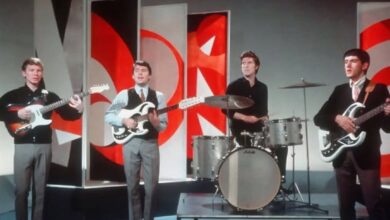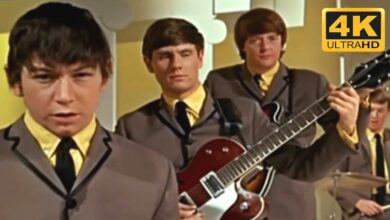Crazy: Patsy Cline’s Timeless Masterpiece That Redefined Country Music
In the early 1960s, the American music scene was graced by the soulful voice of Patsy Cline, a country singer whose influence transcended genres. Born Virginia Patterson Hensley on September 8, 1932, in Winchester, Virginia, Cline’s journey to stardom was marked by perseverance and undeniable talent. Her upbringing in a modest household instilled in her a resilience that would later define her career.
Cline’s initial foray into music saw her performing in local venues, where her powerful vocals quickly garnered attention. Her breakthrough came in 1957 with the hit “Walkin’ After Midnight,” which showcased her ability to blend country with pop sensibilities. This crossover appeal set the stage for her future successes and established her as a formidable presence in the music industry.
In 1961, Cline’s career reached new heights with the release of “I Fall to Pieces,” a song that resonated deeply with audiences and showcased her emotive vocal delivery. The track’s success solidified her status as a leading figure in country music and demonstrated her capacity to convey profound emotion through her performances.
Around this time, a young songwriter named Willie Nelson was making his way through the Nashville music scene. Despite his undeniable talent, Nelson struggled to find artists willing to record his compositions, which often deviated from the traditional country sound. One such song was “Crazy,” a melancholic ballad that would eventually become a timeless classic.
Nelson’s “Crazy” was initially met with hesitation by several artists due to its unconventional structure and complex chord progressions. However, fate intervened when Cline’s husband, Charlie Dick, heard the song and believed it would be a perfect fit for his wife’s vocal style. He introduced the demo to Cline, who, despite initial reservations, agreed to give it a try.
The recording session for “Crazy” was not without its challenges. Cline had recently been involved in a severe car accident, leaving her with broken ribs and significant pain. This made it difficult for her to reach the song’s higher notes. After an initial attempt, producer Owen Bradley decided to record the instrumental track first, allowing Cline time to heal before laying down her vocal performance.
A few weeks later, Cline returned to the studio, her injuries still healing but her determination unwavering. In a remarkable display of professionalism and talent, she delivered the vocal for “Crazy” in a single take. Her rendition imbued the song with a depth of emotion that resonated with listeners, capturing the essence of heartbreak and longing that Nelson had envisioned.
Released in October 1961, “Crazy” quickly climbed the charts, reaching number two on the Billboard Hot Country Singles chart and crossing over to the pop charts, where it peaked at number nine. The song’s success was a testament to Cline’s ability to convey universal emotions, bridging the gap between country and pop music.
The impact of “Crazy” extended beyond its commercial success. The song became Cline’s signature hit, cementing her legacy as one of the most influential vocalists of her time. Her emotive delivery and the song’s poignant lyrics created a timeless piece that continues to resonate with audiences today.
Tragically, Cline’s life was cut short in a plane crash on March 5, 1963, at the age of 30. Despite her brief career, her contributions to music left an indelible mark, influencing countless artists across various genres. Her rendition of “Crazy” remains a benchmark for vocal excellence and emotional expression in music.
Willie Nelson, reflecting on Cline’s interpretation of his song, praised her for bringing “delicacy, soul, and perfect diction” to the performance. Her version of “Crazy” not only elevated her career but also showcased Nelson’s songwriting prowess, leading to his recognition as one of the great American songwriters.
Over the years, “Crazy” has been covered by numerous artists, each bringing their unique style to the song. However, Cline’s rendition remains the definitive version, its timeless appeal undiminished by the passage of time. The song’s inclusion in various films, television shows, and commercials attests to its enduring relevance and emotional impact.
In recognition of its cultural significance, “Crazy” was inducted into the Grammy Hall of Fame in 1992 and the National Recording Registry by the Library of Congress in 2003. These honors reflect the song’s lasting influence and its place in the pantheon of American music classics.
Patsy Cline’s legacy, epitomized by her performance of “Crazy,” continues to inspire artists and captivate audiences. Her ability to convey deep emotion through her music has ensured that her work remains relevant, resonating with new generations of listeners. As a trailblazer in the country music genre, her influence is evident in the works of countless musicians who followed in her footsteps.
The story of “Crazy” is a testament to the power of collaboration between songwriter and performer. Nelson’s poignant lyrics and Cline’s emotive delivery combined to create a song that transcends time, continuing to touch the hearts of listeners more than six decades after its release.
In the annals of music history, “Crazy” stands as a shining example of the magic that can occur when exceptional talent and heartfelt emotion converge. Patsy Cline’s rendition of the song remains a timeless masterpiece, a beacon of artistic excellence that continues to inspire and move audiences around the world.



